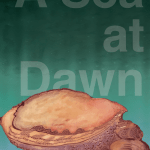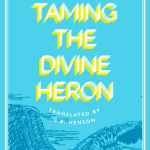Author Archives: smilkova

Creating An Alternative Canon in Translation
The one thing all OVOI translated books have in common is their origin from the margins, either because their authors are exophonic and transnational and have been neglected by mainstream Italian criticism, because the texts deal with problematic themes, or because existing translations do them no justice. Several of the authors we publish for the first time in English are displaced people and a lot of them are women. Some of the stories the books narrate are about gender, sexuality, racial and class discrimination, testimonies of marginalization and abuse.

Translation and its Present Contexts: On Translating Eudora Welty into Hebrew
A year ago, I was relatively new to the United States – living in Durham, North Carolina – when I found a copy of “The Collected Stories of Eudora Welty” in my neighborhood’s Little Free Library. I did not know Welty, but I took the book with me. I thought reading it could be a good way to get oriented. After reading some of it, I closed the book, but something in that story, “Where is the Voice Coming From?,” asked me to translate it. I didn’t understand why. It is a somewhat problematic story, I thought. I felt uneasy.

Ginster, the Critical Idiot? Siegfried Kracauer’s “Ginster,” translated from German by Carl Skoggard
One does not think of fiction when one hears of Siegfried Kracauer, which is a shame. Most Americans who know of the man are acquainted with the two books on cinema he produced after escaping Nazi Europe for New York: the highly influential “From Caligari to Hitler” (1947) and the tome that is “Theory of Film” (1960). But Kracauer also wrote two novels, “Ginster” (1928) and “Georg” (1973, posthumous), and a handful of novellas and short stories, all of which have so far evaded the readerly radar on this side of the Atlantic.

A Renaissance Woman: In Conversation with Italian-Irish writer, scholar, and translator Enrica Ferrara
An Italian-Irish scholar, translator, teacher, and writer, Enrica Ferrara is a Renaissance woman. In this energetic conversation with Stiliana Milkova Rousseva, Enrica Ferrara recounts the story of her debut novel in Italian, “Mia madre aveva una cinquecento gialla” (Fazi, 2024), and discusses some of its major themes and plot elements.

Bibikhin’s Task of the Translator
Vladimir Veniaminovich Bibikhin (1938-2004) was a philosopher, translator, and philologist. During the 1970s and 1980s, Bibikhin established himself as a prominent translator of the most complex philosophical, theological, and literary texts, and as a widely respected humanitarian scholar of a rare and extensive erudition. His translations were remarkable not only as philological, but also as philosophical achievements, as they aggressively revised the principles of text interpretation, typical of the Russian tradition of philosophical translation—something that made many of his contemporaries suspicious of his theoretical and ideological proclivities.

On the Problem of Determining the Essence of Translation
To the extent to which translation is a new re-play, a re-shaping of the given material according to the universal language rules, it is, in principle, just as independent as the original. It is simply that same original, only re-cast in a new form, and continuing to live in that new form. The original appears to be original only outwardly, in a temporal sense. In essence, that is, in its relation to the possibilities of human speech, it is not more original than the translation. The original is lost, imprisoned in its private form. Translatability rescues it from those constraints.

In the Indistinct Borderlands: Silvia Guerra’s “A Sea at Dawn,” translated from Spanish by Jesse Lee Kercheval and Jeannine Marie Pitas
Kercheval and Pitas’s translation of this career-spanning selection of poems marks the first appearance of Silvia Guerra’s work in English. Let me just say that it’s about time. The poems are dense without being claustrophobic, innovative without being gimmicky, and truly, refreshingly strange.

An Endangered World as Allegory and Spectacle in Ádám Bodor’s “The Birds of Verhovina,” translated from Hungarian by Peter Sherwood
Bodor’s prose, in Sherwood’s translation, retains its casual and conversational tone, almost inviting readers to have the text read out loud to enjoy its aural pleasures. That said, the translation also successfully negotiates the nuances of a complex text, and excels at conveying its dark and subversive humour. Most importantly, the translation resists explicitating the original’s ambivalence, in an attempt to refrain from patronizing readers and intrusively helping them navigate Bodor’s frequently disorienting prose.

Nothing Human is Alien in Savyon Liebrecht’s “The Bridesman,” translated from Hebrew by Gilah Kahn-Hoffman
The English title of Israeli author Savyon Liebrecht’s latest work, “The Bridesman,” translated by Gilah Kahn-Hoffman, is a clever rendering of the Hebrew term “shoshbeen,” denoting the close friend or relative of either sex who accompanies bride and groom (one each) to the wedding canopy. The book, set within an Iranian Jewish family in Israel at the end of the 20th century, revolves around the relationship of two young people. It ends in a startling reveal of abuse, paradoxically conducted in the name of family values.

The Sacred and the Profane: Luis Felipe Fabre’s “Recital of the Dark Verses,” translated by Heather Cleary
This novel skillfully explores the blurred lines between the sacred and the profane. In 1592, half a year after St. John’s death, a bailiff and his two assistants, Ferrán and Diego, are hired to transport the body of St. John from Úbeda to Segovia. The journey of the secret transfer is long and challenging.

A Trick of the Tale: Reading and Traveling in Sergio Pitol’s “Taming the Divine Heron,” translated from Spanish by George Henson
“Taming the Devine Heron” is Henson’s sixth translation of books by Pitol. It’s also the second of his trilogy “The Love Parade.” The novel is a major work exhibiting Pitol’s cosmopolitan sensibilities. It’s also a meta-narrative that highlights the self-reflection so evident throughout his oeuvre. Pitol’s literary works are grounded in a type of hybridity that combines fiction, memoir, travel narrative, and biography, to name a few genres. In fact, the entire novel could be read as an exercise in literary imagination, which knows no borders and whose boundary is exclusively contained by the human capacity to wonder.

A Secular Epic: Amanda Berenguer’s “The Lady of Elche,” Translated from Spanish by Kristin Dykstra
Originally published in 1987, “The Lady of Elche” is Berenguer’s fourteenth book of poetry. It combines her characteristic intellectual curiosity with a meditation on the harsh political reality that her country had just lived through.

Against Camouflage: Jozefina Komporaly on Translating from Hungarian Melinda Mátyus’ “MyLifeandMyLife”
Melinda Mátyus’ novel in verse “MyLifeandMyLife” is one of the most original pieces of experimental fiction published in Hungarian in recent years. We are grateful to Ugly Duckling Presse for allowing us to publish here Jozefina Komporaly’s translator’s note in which she discusses Mátyus’ unique sense of grammar and syntax, and her own approach to translating it.

Storybooks, Contemporary Artists, and Family Lexicons: An Interview with Gini Alhadeff
Gini Alhadeff is a prize-winning translator, curator, and author, including of fiction, with the novel “Diary of a Djinn,” and of non-fiction, with a multitude of articles and her memoir “The Sun at Midday: Tales of a Mediterranean Family.” She grew up in Egypt, Sudan, Italy, and Japan. She studied fine art and photography at Harrow in England and at Pratt Institute in New York. She recently translated Natalia Ginzburg’s “The Road to the City” for the distinctive series, Storybook ND, that she curates for New Directions. This interview was conducted over zoom on October 6th, 2023 with Gini Alhadeff in New York City and Saskia Ziolkowski in Durham, NC.

The Afterlives of Natalia Ginzburg’s “The Road to the City”
A new translation of “The Road to the City” (New Directions, 2023) extends the book’s afterlife and illuminates Ginzburg’s distinctive style. The translator, Gini Alhadeff, gives in to Ginzburg’s spare and concise narration without ever losing sight of the novella’s subtle meaning making.
